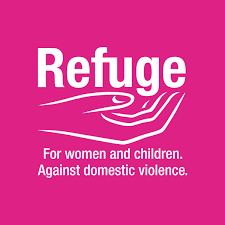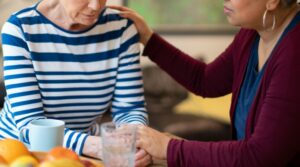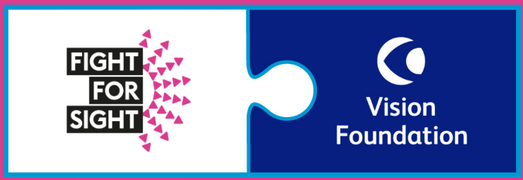Within their lifetimes, 1 in 5 adults face domestic abuse (DVA). Disabled people are three times more likely to experience DVA. In October 2022, Vision Foundation launched a report alongside the charity SafeLives on domestic abuse within the sight loss community, The Unseen. This report unearthed the shocking scale and nature of domestic abuse among blind and partially sighted people.
In order to begin to tackle the issue, we invested just under £200,000 in projects with various organisations, including Refuge, which is the largest provider of domestic abuse services in England. Mari Edwards, Head of Sector Alliances and Partnerships at Refuge, recently shared with us how Vision Foundation’s domestic abuse funding will help to change, as well as save, more lives in the fight against domestic violence.

Can you describe what Refuge does?
Refuge’s frontline facilities and services are divided into community-based and accommodation-based. The former is for survivors who are still living in their own home or with friends and family and who want ongoing support because they wish to remain within their own community. The latter consists of emergency accommodation that women and their children can access when they need to flee from their homes.
As well as offering these services in and outside of London, we run a 24-hour national domestic abuse helpline, 0808 2000 247, that takes calls 24/7, seven days a week.
How did the pandemic affect your services and the people you work with?
Many people within the sector recognised that there was a ‘dual pandemic.’ Initially there was COVID-19 but then following on from that there was a pandemic of violence against women and girls, magnified by the fact they were unable to access help or community support. It became apparent that there was an urgent need to rapidly change and develop the services Refuge offer.
How did Refuge react to the urgent need exacerbated by the pandemic?
One of the ways Refuge adapted was through the increased use of technology to combat the lack of face-to-face contact available to victims and survivors. We offered live chats via our helpline, WhatsApp and phone calls, to maintain contact with survivors and make sure they were getting the help that they needed.
In what ways are blind and partially sighted people especially vulnerable to domestic abuse?
I think visually impaired people can often feel overlooked in domestic violence conversations. As The Unseen report highlighted, pathways for support for blind and partially sighted people are often limited by lack of accessibility. The national domestic abuse helpline, which is run by Refuge offers some accessible options but sign posting to ongoing services can be challenging and many services have historically been reluctant or unable to accept VI survivors.
How has The Unseen Report influenced your service provision?
Refuge now has a strategic focus on increasing pathways of support for survivors who face additional barriers, including survivors who are visually impaired. Off the back of The Unseen Report, Refuge have put together a project that will ensure staff are continuously being upskilled to handle VI domestic abuse cases and to ensure that the services are as inclusive and accessible as possible. We will be doing this over the next few month with three different focuses:
- Refuge staff training
This is all about upskilling staff through e-learning modules (created in partnership with Blind Aid), which are delivered on a rolling basis, not simply as a one-off thing. The modules cover multiple aspects of domestic abuse for VI people, including recognising signs of abuse, as well as advocacy.
We also want to make sure that male survivors of domestic abuse are supported, so we’ve partnered with RESPECT who support male victims of domestic abuse and run the national helpline for men, and we’ve shared our e-learning modules with them.
- Resource packs for accommodation-based staff
Again, working with Blind Aid, we’ve created a resource pack that’s specifically tailored to our frontline staff, working in our emergency accommodation. We have 44 refuges, each of which will now have a pack filled with practical advice and guidance on how best to support a visually impaired survivor in a refuge, covering everything from assistive tech to medication. Details like this matter, small things make a big difference to someone who is entering an unknown environment.
- Reciprocal training
While Blind Aid have offered a lot of insight and assistance to Refuge, Refuge too will be sharing their expertise with Blind Aid staff, who are well versed in VI lived experience but not necessarily with domestic abuse. Refuge will provide specialist training on domestic abuse for Blind Aid staff, who work closely alongside service users, often visiting them in their own homes.
In 2022, Blind Aid supported 1300 people with individualised practical and emotional support, so being able to better understand the signs of domestic abuse will be hugely impactful. Often it can be as simple as finding a way to allow people to disclose any issues they may be facing, so they can ultimately get help.
What makes Refuge so special?
At Refuge the overall message we want to get out to those who might be living with domestic abuse, is that we will validate you. We will listen without judgement and believe what you tell us. These simple things can make the world of difference for someone who has been told for months, years and even decades that their feelings aren’t valid, no one is going to believe them, and they will be judged.
We’re here to offer emotional as well as practical support and thanks to The Unseen we will ensure that VI survivors will feel heard and no longer overlooked. We want them to know that they can survive, and they can thrive.
 What’s it like to work for Refuge?
What’s it like to work for Refuge?
The people are what make it an amazing organisation. The strength of the survivors we work with inspire the whole team every day. We all know that we’re making a real difference to lives of women and children and that’s incredibly fulfilling.
Is there anything else you’d like to share about the work you do?
I think it’s important to express, as often as we can, that domestic abuse comes in many different forms; it isn’t just physical. I’d like to point people to our website and the section on spotting the signs of domestic abuse. Realising that the term ‘abuse’ can cover many different things, is crucial in helping people recognise their own treatment so they can get support.

